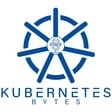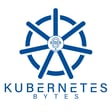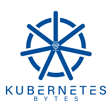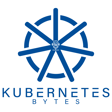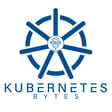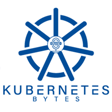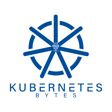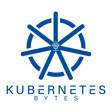Become a Creator today!Start creating today - Share your story with the world!
Start for free
00:00:00
00:00:01

Part 1 - Live from Kubecon North America 2022 - Interviews with Percona, EDB, Dell, and Akamai
In this part - 1 episode of Kubernetes Bytes - live from Detroit during the Kubecon + CloudNativeCon North America 2022, Ryan Wallner and Bhavin Shah talk to guests on the show floor and learn more about what's new at Kubecon, what are their thoughts on Day 0 events, Keynotes, etc, and also share some things to do in Detroit. They talk to Peter Zaitsev - Founder of Percona, Gabriele Bartolini - VP of Cloud Native at EDB, Tim Banks - Lead Developer Advocate at Dell Technologies and Stephen Rust - Principal Software Engineer at Akamai.
Show Notes:
Transcript
Introduction to Kubernetes Bites
00:00:03
Speaker
You are listening to Kubernetes Bites, a podcast bringing you the latest from the world of cloud native data management. My name is Ryan Walner and I'm joined by Bob and Shaw coming to you from Boston, Massachusetts. We'll be sharing our thoughts on recent cloud native news and talking to industry experts about their experiences and challenges managing the wealth of data in today's cloud native ecosystem.
Live from KubeCon 2022
00:00:29
Speaker
Good morning, good afternoon, and good evening wherever you are. We're coming to you actually from Detroit, Michigan, live at QCon 2022 in North America. Hope everyone is doing well and staying safe. Let's dive into it. Bhavan, we are here live.
00:00:45
Speaker
You know, live from KubeCon. It's nice to see you in person. That's what I have to say. That's my biggest takeaway, like, for the show. Regardless of who we interviewed this week, it's going to be like, OK, I got to hang out with Ryan for a week on nonstop. Yeah, no, it's really nice to see people's faces, interact with them, be on the show floor again. I miss Valencia, you as well. So this is like our first KubeCon in a while. And we're going to be doing a lot of awesome stuff. How's the show going for you, first of all?
00:01:11
Speaker
The show has been great. So this is today's Wednesday, right? This is the first time we are recording this part. Monday we had an awesome panel at the Data on Communities community. I really like the hybrid format that they had where they had like people presenting over Zoom to be more inclusive. I remember somebody from Israel had actually done a great presentation. We obviously had a lot of fun in our panel. Hanging out with Patrick and Gabriel and Jing is always a lot of fun.
00:01:33
Speaker
I think a lot of interesting questions also came up from our audience. So in addition to the questions that we had prepared for us, I think we had a few good questions. Yeah. And we'll actually post the link because that whole day was it's like an eight hour recording that's live on YouTube now. DOK community YouTube will post it. But ironically, what you won't see in that is that Bob and I were out to lunch and we thought we'd have plenty of time to grab a sandwich or something like that and get back to the show. And turns out our food took forever to show up.
00:02:03
Speaker
And so we're sort of jogging back to the DOK community. And as we're walking up the stairs, Bart is basically introducing us. It's a good look for us. But yeah, it was great to talk with Patrick and Shane Gabriel. And I think, like you said, the community had really great questions. I think it reinforces that a lot of people are still new to the space, really understanding what it means to do data on Kubernetes persistent storage in that context and sort of
00:02:33
Speaker
how to get there, right? Still working with VMs,
Exploring Kubernetes and Data Management
00:02:36
Speaker
so. I know, and I think the ADA recording, as you said, is a long thing. I do need to go back and see if Bart actually did a rap for us at the end. I saw it on Slack. Like, he has an awesome rap written just for our session. I was like, shit, I missed it, but no.
00:02:50
Speaker
I know. It is live, so I did check it out. It's already up, and it'll be good. I missed it, too. Obviously, we were both running up the stairs together. So, hey, you know, it keeps it interesting. Needless to say, we have a fun week ahead of us. We're going to be interviewing a whole bunch of past guests, brand new guests for the Kubernetes Bites podcast. It's going to be a little different than what you're used to if you're a listener and have been a listener. We're going to do sort of live sound bites, so to speak,
00:03:19
Speaker
Kubernetes Bites, I guess you could say, and do about five, 10 minutes. Maybe it'll be a little less, a little more, each person we talk to, and just get their take on the show, what they're doing here. Maybe they're working on something specific that maybe they're doing a talk. Those kind of things, we really want to hear from them and their experience at KubeCon. So hopefully that's enjoyable for everybody. And here we go.
Peter Zaitsev on Open Source Databases and Kubernetes
00:03:43
Speaker
Yeah, in regular episodes, we usually do a news segment. I don't think we'll have that this week.
00:03:48
Speaker
Maybe we'll come back. You never know. We'll do a follow-up episode where we recap everything that happened at KubeCon. Just live from KubeCon. Absolutely. I think we should. We'll definitely give some opinions and a wrap-up after we do all the interviews. We'll put it together and give you our take on it and maybe what we've learned from the show.
00:04:07
Speaker
We'll get going. So on to our first guest. So we're here live at KubeCon. We have Peter with us. Give yourself a little intro for everybody. Yeah. So my name is Peter Zaitsev. I am a founder and until recently CEO at KubeCon, where we specialize in solutions for open source databases. And Kubernetes for us is a strategic, is probably like a fastest deployment platform for our solution.
00:04:36
Speaker
Kulture, how has KubeCon been for you so far? Oh, it's been great, right? It's nice to see the show with a lot of energy, a lot of attendance post-pandemic, because I think many shows have been still kind of, you know, shade of form themselves post-pandemic. But, you know, I think the amount of people and energy we have here just, you know, speaks to really the, you know, growth and energy and popularity of Kubernetes and cloud-native technologies.
00:05:05
Speaker
Yeah, absolutely. Where are you in Valencia?
00:05:08
Speaker
No, we're not. Neither were we. And I think just being here, I think even from the folks that we knew at Valencia, I think the energy here, like you're saying, is even more so than it was in Valencia and definitely before that in L.A. Yeah, L.A. was really slow, really sad. Like, I think there were like 4000 people, half of them were just vendors talking to each other. So, yeah, this is a really good improvement from last year, North America, KubeCon. Yeah. So what
Challenges and Innovations in Kubernetes Storage
00:05:35
Speaker
are you working on? What's new at Percona?
00:05:37
Speaker
So at Percona, a lot of Kubernetes related for us is operators or databases. So we specialize at MySQL, MongoDB, Postgres, and we build the operators for all of them, which are, I think, one of the best operators around those databases, really kind of barrel tested.
00:06:01
Speaker
I think what's also unique about our solution, we provide those operators with a very similar UX. So you deploy the database, MySQL, Postgres, MongoDB,
00:06:13
Speaker
basically in the same way, right? Just, you know, changing a few things, which is, I think, important because now there is not really standardization for, you know, a format, different operators to use for databases, right? And until something exists in this divide, the best we can do is provide that for our customers.
00:06:33
Speaker
So it's just one operator for all three different databases? No, no, it's a separate operators for each of them, but they are full of the same definition start, right? And look at field for those deployment in the same way. Hey, you know what? If you want to back up, you add the section, which looks pretty much the same, right? Not like different ways here and there.
00:06:54
Speaker
Got it, yeah. So, I mean, you know, Dela, Bobbin and I have been sort of in this sort of persistent storage space, data management space for a while. You know, I think we're familiar with Percona, but what are still some of the challenges, I guess, with sort of where Percona has come in the community? I know we, you know, we both spoke at DOK day, so I know we're all very familiar with this problem, but maybe for those listening, you know, could you sort of recap summarize what those challenges have been and where, you know, Percona is today with that?
00:07:23
Speaker
Oh, big question, but you know. Yeah, well, I think if you look at Kubernetes right now, it started as a solution for stateless application, right? And the database is, of course, opposite of
00:07:43
Speaker
And Kubernetes approach, I think, was like, well, you run up your applications in the Kubernetes and you store your state in the database and which kind of exists somewhere externally to Kubernetes. But guess what? As we are moving more in Kubernetes adoption, now we want to take more of the stuff in, including the database. And Kubernetes was improving.
00:08:07
Speaker
in support, stateful set with persistent volumes, operator frameworks, that is all have been fantastic. I think there's more and more also uniform approaches coming up in a storage, which is a very
00:08:29
Speaker
very critical in the database. One of the things that I know we are looking at is how, for example, to do that kind of clone process faster. Because doing that on a database level is kind of expensive.
00:08:48
Speaker
Data and if you want to do it for you know, 10 terabyte plus. Oh, yeah is not a great thing, right and Given ranges so far right you have different storage providers, right? You can have a you know, create a Volume like clone, right? Sure with some of them, but it's not unified yet as I would like to see more of a
00:09:10
Speaker
I would say unification in that level, so we can use a high level of structure. Do you see CSI being sort of a component of maybe what that would be? Absolutely. I think I just have to get more interfaces. And again, I'm by no means the Kubernetes expert, but I was very glad to see what you have.
00:09:33
Speaker
dynamic volume extension as a sort of GA because that is another important piece. We don't want to provision 10 terabytes of storage for everybody. We just want to dynamically grow. And if you think from a big vision standpoint, I think what we see is what a lot of the developers in a database space right now are
00:10:01
Speaker
addicted to that database as a service. Sure. Amazon RDS, right? And it's kind of just does a lot of stuff good enough in an automated way, right? And what I want to see is Kubernetes being a building block, which allows to provide that. And then, well, guess what? If you like that infrastructure,
00:10:25
Speaker
code approach, you can just use Kubernetes operator. If you somebody who needs more like UX, well you just, you know, will put graphical user interface on top of that and have a really competitive solution to the RDS, Atlas, right?
00:10:43
Speaker
I think graphical user interface is important, but most of the users, most of those power users will definitely use APIs. Absolutely, but I think what is interesting is to get to that kind of power users. In many cases you go through that sort of testing stage, and that is very good, it's very helpful.
00:11:07
Speaker
integrate something in my CICD pipeline, it's going to API, right? I'm not going to do that with GUI, right? That doesn't make sense. But the first way to fill it through to understand how it works, right? You know, what the API calls are, what we need it to do, right? GUI is very helpful.
00:11:25
Speaker
Yeah, I mean, even coming back to the RDS example you gave, right? If you're going to go see what RDS is all about, you're probably just going to go to the Amazon console, go to the RDS service, poke around, maybe deploy something, and to test that. Not to mention that there are APIs, right? You probably would start using it, right? Oh, yeah. So same sort of example, I think, in Kubernetes is that we've come a long way. I think managing databases early days in Kubernetes, you're writing your own deployments, you were sort of doing your own multiple deployments because stateful sets weren't a thing. Operators definitely
00:11:54
Speaker
help that experience and especially when they're baked into, I think, you know, certain, you know, Kubernetes distros. So like, if it's OpenShift, if it's, if it's Rancher, if it's something else, you can use operators in a much more friendly way. Oh, yeah, absolutely. Well, I think what is also interesting in terms of what we are doing and how we are seeing, I think it's very similar to like, to what Amazon has. Yeah. Discovered himself as well, right? In the database space, a lot of those database engines were kind of
00:12:24
Speaker
commodity, right? It's not a part of the whole solution. Yes, there is MySQL, Postgres, right, whatever, but you need to have a full experience beyond that, right? Like you want, you know, high availability, you want observability, you want backups, right? You want to maybe kind of self-healing on top of that, right? And while the database server is an important component, right, it's not
00:12:54
Speaker
the only component what's needed. And that is what we are working at the corner, is to make sure you do have all those solutions you need in the open source space. Right. Yeah. No, that makes sense. I think that's awesome. Thank you so much, Peter, for joining us. Yeah, Peter, thanks for starting and taking some time with us here at KubeCon. And I'm sure we'll see you around the rest of the show. OK, thank you. Thank you.
00:13:22
Speaker
So Gabriel, thanks for joining Kubernetes Bites here live at KubeCon. How's it going?
Gabriel Bartolini on PostgreSQL in Kubernetes
00:13:27
Speaker
Thanks, Ryan. Thanks, Bobby. It's great. Give everybody who's listening sort of an intro who you are. Yeah, so I'm Gabrielle Bartolini. I'm VP of cloud native at EDB. EDB is probably the largest contributor to the open source PostgreSQL project. And you know PostgreSQL is the most loved database. Recently, there was a survey from Stack Overflow.
00:13:52
Speaker
and Postgres was, you know, nominated the most loved database by developers. Okay. So, but yeah, I think we all know for it. I love Postgres. I'll add to that survey, I guess. I think in addition to VP at EDB, you are also like the first repeat guest that we have had on one of these bytes. Oh, thanks. I'm, you know, flatter.
00:14:17
Speaker
So for those listening, you know, we said we were going to post a link to our DOK talk, which was a panel with Gabriel and others on there. You know, how did that go for you? What did you think that was all about? I mean, you know that it's like, you know, I play the blues, you know, I play, you know, guitar and.
00:14:35
Speaker
You know, when you go to a gym session and you really enjoy that gym session, I felt like that was a special occasion, that in that moment, I think we were kind of doing something extraordinary that I think we will remember in the future. And especially I think the dollar on the Kubernetes community is really, in my opinion, doing a great job in building awareness about running,
00:15:03
Speaker
Stateful workloads in Kubernetes and you know database is probably one of the most complex Absolutely. We were talking earlier about I think the the feedback we got after the panel to you know Sometimes you can get sort of crickets, but I think we had real questions from people Looking to both get into this space, but also hey, I'm running Kubernetes. How do I do this for my you know for my users? What's the right way to do it?
00:15:27
Speaker
It shows just people are really starting to think about it, but still early, right? I think we talked to a lot of people that may be further along in that journey regularly, but there's still a lot of people sort of being new to that. I think DOK and Bart do a great job. It's so much fun.
00:15:43
Speaker
OK, so I heard Postgres 15 is out. Can you talk about that? Yeah, Postgres 15 was just released two weeks ago. And by the way, this week there's the Postgres Europe Conference in Berlin. Actually, these days I couldn't be there. I'm actually one of the founders of Postgres Europe. OK. So I mean, not to be there for me after Covid is a bit tough. But I prefer to come here because I think it's more important to
00:16:12
Speaker
promote Postgres in this context. So if 15 was out, and I think the number one feature that was introduced by actually my colleague, Alvaro Herrera, from Chile, like Jonathan, who presented the other day at the UK, is the merge command. So merge is an SQL command.
00:16:38
Speaker
enables to simulate insert and update in case of conflict. So it's a very interesting feature. Then, you know, there were other improvements in logical replication. So for example, if you want to use change data capture with Postgres, for example, insert records in Postgres, then consume them into Kafka, you can now use filters in the
00:17:05
Speaker
logical decoder. So this is all performance improvements, improvements for backups.
00:17:13
Speaker
Again, another important major release of Postgres. Just keep moving forward, right? Just keep making progress. Keeping Postgres even more lovable. Oh, wow. We need to get hats. Since we have started to adopt the one major version, I think it's more than 15 years, now we have the model.
00:17:40
Speaker
continuous innovations, so I'm really proud. So can we do PostgreSQL 15 on Kubernetes? Oh yeah, already. I mean, if you just use PostgreSQL 15 image with our operator, cognitivePG, you can already use that. That's awesome. And from the next release, which we were supposed to release this week, but we prefer to wait for Kubernetes. It will be the default one.
00:18:07
Speaker
Okay. It's already tested. We have been testing Postgres 15 since the first beta was released three, four months ago. Okay. So, it's all good. And we will release Cloud Native PG 118 probably the first week of November. Yeah. And that will include automated support for cluster managed replication slots. Great. And ivernation.
00:18:35
Speaker
So now you can hibernate a cluster, and it will be reduced to PVC from the primary object. OK, nice. So basically, hibernation is scaling down the actual pods. Correct. Scale to zero. Some people call it scale to zero as well. So you've got a three-node cluster. You hibernate that. The standbys are destroyed. Only the PVCs of the primary are kept there. And you can defrost that in the, you know,
00:19:04
Speaker
at a later time when the cluster resource is regenerated as it was before. I imagine you do some sort of flushing of the database so you make sure data is written all down to desk before you. Correct. So we have a mechanism already, it's called fencing. So we fence the cluster, so the PostgreSQL is correctly shut down.
00:19:26
Speaker
Do you see a lot of people using this feature? Like asking for this feature? Yeah, the customers have been asking. Can I take a hibernated cluster and move it to a different Kubernetes cluster? Oh wow, okay. For example, we are using these also because I work for EDB. It is the original creator of the Appuracer and EDB donated the IP to the community.
00:19:56
Speaker
We have an Enterprise Edition of the operator, which will use this kind of feature to, for example, backup also using Valero or other backup tools, using the same concept. The idea is to bring this to the next level, for example, by performing even in-place upgrades of major releases, of course, within the future.
00:20:22
Speaker
Yeah, it's an interesting concept. I think these are the kind of tools that we've been used to in VMware, too, of being able to freeze things, unthaw things. And seeing that sort of adoption and customers asking for it, I think also just validates, I think, for you guys probably. And also hearing you working on releasing those really brings us to a point in adoption that really we can take advantage of those things.
00:20:48
Speaker
Well, Gabriel, thanks for stopping by. This was great. Thank you. And we'll be in touch. I'm sure it'll be on the show again soon. Yeah. And tomorrow I'm going to talk about Clan Native PG with Chris Milstead from Ondaat at 4.30. I don't remember the room.
00:21:09
Speaker
We will make sure and put a link to that talk as well as when it's posted, hopefully recorded, I imagine. We'll post the link to that for this show as well for those listening and wondering where that talk is. You can listen to Gabriel and folks from on deck. Okay. Thank you, Ryan. Thanks, Bavin. Thank you for being on, Gabriel.
Tim Banks on Conference Interactions and Dell's Role
00:21:31
Speaker
Tim, thanks for joining Kubernetes Bites. How's it going? Introduce yourself for everybody. Oh, sure. My name is Tim Banks. I am a new lead developer advocate at Dell Technologies, but not the newest. Apparently I've started two months ago and there are two more, you know, Ryan here and then...
00:21:49
Speaker
the wonderful Cat Cosgrove. So yeah, here on an expanding team full of excitement, we're looking for one more, by the way, folks out there listening. You want to apply and want to work with the best. You know, that's great. But if you want to work with us, that's good, too. That is good, too. Yeah. So how's QCon going so far? I know it's Wednesday. We're sort of mid-round here for a lot of us. A lot of us showed up Monday. What are you getting out of it so far? What are you looking forward to?
00:22:17
Speaker
So, so far, what I'm getting out of it was, you know, the hallway track and, you know, talking with folks that either you've been talking to online or finding other ways to converse. Like, I think it's interesting because one of the things the pandemic, I think, really taught us is that, you know, the keynote talks and all that kind of stuff like that.
00:22:37
Speaker
They're not really value ads for a conference because we could watch those on YouTube and that's what we did for like two years, right? And like, yeah, okay, but that does not a conference make, right? It is the coming together, the impromptu talks over, you know, food or drink or something like that.
00:22:52
Speaker
I don't know, like we, I think, you know, last night at the company party, I think we designed like four or five products just off the top of our head. But those things happen and I have witnessed hallway track conversations go from a conversation to a POC in a few months, right? So it's like, those things are exciting and the conversations you have over, you know, just that happen organically are to me what makes the conference a conference. So there's been some of that, I'm looking forward to that.
00:23:19
Speaker
you know, you know, making some connections with some really, really cool people from around the industry and various segments has been awesome. And, you know, I'm looking forward to more of that. Obviously, the, you know, the talks are going to be the talks and those will be all great, you know, but, you know, oh, and the other part, too, is that you weren't here for it. The red beans and rice they had, man, that shot was legit. I didn't have that. No, I had the skewers, the chicken. Del apostrophe J.I.T. legit. And I was not expecting that. Which is saying a lot coming from you, I feel like. No, no, I had my
00:23:48
Speaker
My expectations of the food in Detroit were not bad. They just weren't great. But I've far exceeded what my expectations so far. So outside of the food, what do you like about this KubeCon and how do you compare it with the previous ones that you have been to? So the main feature about the KubeCon I like right now is that the level of organization they have is just getting better and better and better.
00:24:12
Speaker
You know, as always, hats off to the logistics folks and the people doing all the, you know, behind the scenes work, but everything has been well thought out. You know, even large major conferences, you see like bottlenecks and like who put this in and stuff like that. So they've been really, this was really well thought out. It was very...
00:24:29
Speaker
So, you know, there's, there's a lot of space. So we're not all packed in there, like, like, you know, sardines or anything like that, but also like, but like folks for me who are narrow divergent, you know, I can't be in those rooms for a long time. So there's places for me to go away and just chill and stuff like that. Perfect.
00:24:48
Speaker
Um, you know, and so I, I always say, cause you know, like, yeah, the vendors are going to be there. They're going to have the booths. Like we know, you know, that's always going to be there. There's this swag and people are like, Oh, the swag was great here. The swag was great there. Okay. Whatever. Um, but the conference experience is what matters to me. And they have been very thoughtful about that here. And so I appreciate that.
00:25:09
Speaker
Yeah, I think there's, what, there's quiet rooms. Maybe that's where you've explored. Those quiet rooms are nice to just get away from it. I know even someone like myself who I call myself an ambivert, right, between introvert, extrovert, extrovert when I need to, I appreciate those quiet times because I feel like long enough, anybody sort of being on for that long, you just, you know, you get sort of that little headache, right here, right here. That's the thing that people don't talk about too. I think for, you know, attendees is one thing, but for folks who have to work,
00:25:39
Speaker
having to be on, you know, especially if you've got booth duty and you've got these other things like that. I mean, it's like, yeah, I'm expected to be on. I can be on with the best of them, but when I'm off, I'm off, right? You know, so it's like, you know, I can't be on all day and then go out and party. Like, this is not me, you know? I mean, I used to could, right? But I also used to could be able to, you know, wake up in the morning, get my knees hurt and stuff.
00:26:05
Speaker
Yeah, that's true. So you're part of a new team. Obviously, I'm part of that team too. But what are you looking forward to? What are you trying to build? Like what's important to you going forward at that new role? The thing I'm trying to build more than anything else is the community, right? People in the cloud data community.
00:26:23
Speaker
for the most part, don't think about Dell when they think about that community. Now Dell put a great foot forward here by being a platinum sponsor. They put a lot of money into this, their first KubeCon, which is awesome, right? But we need to be able to follow that up with action. We need to be able to say to the community, we are here to help you. We're here to be part of you and follow that up with action. So we need to listen to the folks in the community. We need to contribute, not just
00:26:48
Speaker
not just accept the free labor from, but to be like, hey, cool, we're going to vote our own resources and our own things like that. And let the community dictate what our developer advocacy program looks like so that we can bring that feedback back to our product teams and back to our software engineers and back to all the various things that we have. It does get a lot of resources that people know, really understand. But I do think that
00:27:16
Speaker
you know, this first real step in us saying, okay, we're here and we want to be part of this community. Um, it's good. We just need to make sure we follow it up with action, incremental action over and over and over again. Um, which is why I think, you know, we, we take KubeCon is different than like reinvent reinvent. It's a big conference. A lot of people there, but it is a vendor conference. They are just there to sell more AWS, which is why it should be free. But, um,
00:27:42
Speaker
But this one is different. This is for the community by the community. And so I think it's important for us to do that. And what I've found already is that we're having conversation about people asking, well, why are you here? Like, what do you do? You're like, yeah, we're going to draw them in with the free laptop. Come get the free laptop.
00:28:03
Speaker
You can win for your lap. You'll just get it. I mean, you do just get it if you get picked. But it's like, you know, I want to talk to him about, well, what are you working on? Oh, cool. Well, what does that look like in that space? I've had some great conversations about that.
00:28:17
Speaker
If you, what I want more than anything else, people don't do anything else when they walk away from this. They want to walk away from this with, let me go visit the developer community site or let me go visit the GitHub or just let me just see what's up with this. That's all we really want. Just give us a chance to interact with you and to be part of that community and then we'll go from there.
00:28:37
Speaker
Yeah. I think if you didn't know Bobbin, also, Tim is from Austin, Texas. OK. And so if you see anybody walking around outside when he's 50 degrees and he's like shivering and swearing, he doesn't like this weather too much. Although you might just take one of our beanies at least. You know, it's rare because I'm going to be very honest, right? I will probably not wear a beanie because the worst thing you can do to my hair is to cover it with something that is not satin.
00:29:07
Speaker
So for Dell, I'm going to, so we want to really do something. We need to have satin lined beanies. There we go. I like it. I'll dig it. I'll recommend it too.
Stephen Rust on Building Akamai Linode's Kubernetes Service
00:29:17
Speaker
Well, Tim, it's been a pleasure. Thanks for taking the time to come over here and chat with Bob and I and get your take. And hopefully everybody will have you on for a full episode one day. Yeah, absolutely. Absolutely. I'd love to anytime.
00:29:33
Speaker
Steven, thanks for joining us live at KubeCon. Absolutely. Let our listeners know who you are and what you're up to. Cool. Thanks for having me. So my name is Steven Rust. I'm a principal software engineer at Akamai Linode. So I'm the lead container architect over there now. So I'm working on our managed Kubernetes service, which is LKE.
00:29:58
Speaker
as well as working on building services on top of Kubernetes, both for internal and for external customers. Awesome. So for those who don't know where Akamai is based and know where the show and Bava and I are based, it also is in Boston. So we have a local, so to speak, that we're all sitting in Detroit, Michigan. We're all local.
00:30:22
Speaker
But okay, so we're here at KubeCon. How's the show going for you? What are you really getting out of the show? Tell us all about that. It's great. There's a lot of reasons to be here. And I think for me, in my position, it's a bit of a mix. So I'm trying to connect with potential partners and reach out to, do you want to come to deploy on Linode? Can we help you in some way?
00:30:53
Speaker
And also just here to learn, and that's really where you get really reinvigorated and more interested again in the technology is just sitting and learning. So I was just learning about cluster API some more, which I'm trying to, yeah, there you go. Trying to learn more about and perhaps do some more in that space.
00:31:14
Speaker
Absolutely. I think Scott Lowe is joining us tomorrow to talk more about what he's doing here. He's been a past guest on the show. I don't think I was actually a part of that episode. That was you and Scott, but really fun episode to listen to as well. So I have a question for you, Stephen. What's involved in building a managed Kubernetes service? I think you were the first one that I was told he's working on something so cool. So what's involved in that?
00:31:37
Speaker
So this is what you do now if you're a cloud provider. You offer a managed Kubernetes service. Sure, sure. Give it a cool name. Yep. So it has to be K-E, something in front, right? So everyone's got their... Unless you are Azure. Some kind of engine of some kind anyway, right? So there's a lot of different ways to do it, but you want to basically handle the control plane for your customer. That's the big thing.
00:32:06
Speaker
Um, and whether that's abstracted for them, uh, whether they see that at all. So in the Linode case, you don't really see your control plane or in your control plane nodes. Um, and then you manage the service. So management really means about upgrades, uh, dealing with, uh, dependencies or, you know, building your own distro. So everyone has a Kubernetes distro now. Um, and then there's.
00:32:36
Speaker
There's, you know, you can debate whether that's a good idea or not. And it's maybe better to standardize on people that are good at distro building. But in the cloud environment for the managed service, it does tend to make sense to build your own so that you have full control over that. And maybe you do things differently from other providers as well. Right. So I know, you know, the control plane and managing that for the customer
00:33:00
Speaker
That's something we see across a lot of different services, EKS, AKS. I mean, that's, I think, come to be the expectation. What does LKE do in terms of node and worker node upgrades, managing those nodes? What do they do to help ease that process? Yeah, so because the control plane is totally separate, your worker nodes are essentially disposable, in a sense.
00:33:27
Speaker
So you can recycle and delete them, I would call it recycling. So you can delete a worker node and it'll come back. So the upgrade is really create a new node on the new version and then delete the old ones along the way. So a customer can choose the time to do that and roll that out carefully for themselves.
00:33:49
Speaker
And then at some point there is an EOL that we have to upgrade for security and all that purpose. Of course, yeah. We can't support all versions forever. But we're actually looking to- Even though your customers want you to, right? They do. And I think other providers do support more. Sure. So that's something that we're trying to improve and work on as well. Can we support more versions longer? Yeah. But then to the customer, it should be transparent. So certainly from a control plane standpoint,
00:34:18
Speaker
All the upgrades, the management of that is out of their control in a sense. And that's a good thing. That's why you're running a managed service. If you want to have full control over your cluster, fine. Deploy on VMs at Linode, run, use Rancher, use OpenShift, whatever, some other.
00:34:39
Speaker
distribution. So I think when we had Brendan Burns on the podcast, he said, eventually we want to get to a state where customers don't even know what the version is. Like we'll do whenever a new version of Kubernetes is out, just a form an upgrade under the covers. You have your applications running and Kubernetes will respawn your pods if they get deleted on that node. So should be a non-disruptive upgrade and
00:35:01
Speaker
It's a good idea as long as you're API compatible. Yeah. So we've come across where you have to be on a particular version because maybe your app hasn't upgraded their API yet. Right. V1 beta 1 to V1. Yeah. I think everybody who's in that DevRel space or tech marketing space broke their applications when they upgraded from 190 to 120. Oh, I bet. Happened to me. Yeah.
00:35:27
Speaker
So that goes to trying to support more versions for longer as well and then helping that upgrade path if you can. So I think that sounds like a great goal, great idea to be completely
00:35:42
Speaker
not worrying about the version. It's a North Star. I think it just shows where the entire community and those building managed Kubernetes and those in this sort of community here at KubeCon, where we're at in terms of viewing what Kubernetes is giving us in terms of value.
00:35:59
Speaker
We're starting to focus more on the business value, the application and what that provides. So leads me to another question, which is, you know, how is LKE different? What's unique about LKE? I don't know much about it. So school us. Yeah, I mean, I think you'll find this with all of the node. It's all about simplicity. Okay. So
00:36:21
Speaker
you have basically a one button create cluster and you're good to go. So we try to keep that as simple as possible. Um, not have to go through a lot of hoops. And I guess you could say there's trade offs there as well. So you, you know, maybe you, you lose some of the configurability along the way. Um, but simple cluster up and running, download your Cuban config and you're good to go. Got it. Um, so that that's number one. Um, and then really,
00:36:50
Speaker
you know, just being able to use it and have full control over the nodes that you have. And you're an admin on your cluster and then you deploy anything you want and not worry about the stuff that you don't want to worry about. Got it. So we'll switch gears a little bit about. And since those listeners aren't going to be with us here in Detroit, tell us one thing you've really enjoyed about Detroit and the experience here at KubeCon.
00:37:17
Speaker
Uh, wow. Well, uh, we had some really good pizza the other night. I'm already hungry. Um, I have, did not know that Detroit had its own type of pizza. I was Detroit pizza until I came here. It's probably one of the more least well known, I feel like, uh, in terms of how it's made and like the differences of it. I think when you think of this area, they're like, Oh, Chicago deep dish. No, no, no, it's not the same. Yeah.
00:37:44
Speaker
Yeah. It was very, very cheesy in a sense, in a good way. I know where I am headed after recording this podcast. But yeah, I haven't actually been to Detroit before. So it's actually the right on the water is pretty beautiful. I did not realize that we're about
00:38:03
Speaker
No, two seconds from Canada as well. So maybe I'll head over there later. I think our Uber driver said if you are actually a good swimmer, you can actually make your way. But if you're not, you'll end up in a... Which is first people, he said. Oh, you could just swim, okay. Or you'll end up in Lake Erie. That's what he said. He said a lot of people try wide open Lake Erie.
00:38:24
Speaker
Interesting. I don't know how he knows this or has experience of why he knows this. He maybe gets a lot of pickups from Lake Erie. Do you keep the passport in like a waterproof bag or something? I think Canada will let you in if you actually make the swim across. They might have to take you in to save your life at that point. Cool. So thanks for joining us. Where can people find you if they want to learn more about Elke, Linode, what you're doing?
00:38:51
Speaker
Uh, yeah. So, uh, my username everywhere is just S rust. So I'm on, I'm on Twitter, GitHub, um, email. Um, so I actually, so I, interestingly, I came from the Akamai side. So Akamai purchased Linode recently. Um, and they are continuing to invest. And so, um, I was one of the people who brought over to, uh, continue to work on that.
00:39:19
Speaker
And there's a bunch of people that also are working and were from Akamai before, so that's pretty cool as a kind of merging of the nodes, Kubernetes folks, Akamai's Kubernetes folks, and now working together, which is pretty neat. But yeah, so...
00:39:37
Speaker
The other thing, Linode is hiring. This is what KubeCon is all about. Go for it. No, it's just Linode.com slash careers. We're hiring Kubernetes folks for sure. Yeah. We will put that link in the show notes for you listening if you have an easy way to find it. That's my only pitch.
00:39:56
Speaker
Well, we appreciate you taking the time to come join us here over next to the water with these beautiful views. You can't see it on the podcast if you're listening, unfortunately, but it is beautiful. And I'm sure we'll try to get you back on the podcast for a full episode of what you're doing with Linode and Akamai. Sounds great. Awesome. Thanks so much for having me. Thank you for being on.
00:40:19
Speaker
Hello,
Episode Conclusion and Split Announcement
00:40:20
Speaker
everyone. It's Bobbin and Ryan. We're actually going to interrupt this podcast because we decided we're going to split this into two podcasts because we realized, Bobbin, that it was quite a long episode if we just crammed all eight interviews into one. We didn't want to have one 80, 90 minute episode. I know people don't like that or personally, I don't. So this is a way where we can have two episodes and people can enjoy them on their walks.
00:40:46
Speaker
Absolutely. So who do we just hear from? We'll just do a quick recap here. Yep. So we did Peter from Prokona. We did Gabriel from EDB, Tim Banks, your new teammate from Dell. We did Steven Russ from Akamai and all were great conversations and we have more queued up for the next part as well.
00:41:05
Speaker
Absolutely. So we appreciate you joining us for this sort of pseudo live from QCon episode part one and part two. You can find the next part in the next episode and we'll see you over there. Thank you for listening to the Kubernetes Bites podcast.
